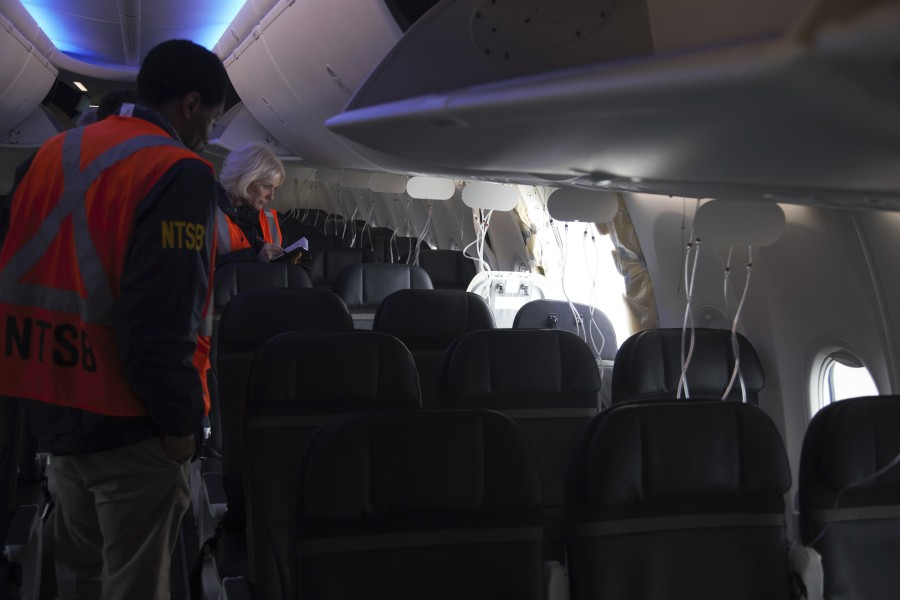SEATTLE — In response to sharp criticism from the Federal Aviation Administration, airlines and the public in the wake of the Alaska Airlines in-flight fuselage blowout on a 737 MAX 9, Boeing on Monday laid out new measures to strengthen its quality control system.
These include an independent outside assessment of Boeing’s airplane assembly practices.
And both Boeing and its major 737 supplier Spirit AeroSystems of Wichita, Kansas, will open their factories to inspectors from the airlines whose jets they are building.
In a message to all employees, Boeing Commercial Airplanes boss Stan Deal acknowledged the need to bolster quality oversight both internally and by allowing more outside review after the Flight 1282 accident when a fuselage door plug exploded off the airplane, leaving a gaping hole by a window seat 16,000 feet above Portland.
Deal wrote that the Flight 1282 accident, which traumatized some passengers, and the subsequent finding of loose bolts on other 737 MAX 9s “make clear that we are not where we need to be.”
Deal said his team is “taking a hard look at our quality practices in our factories and across our production system.”
In early 2019, Boeing had trumpeted a plan to speed production by reducing quality inspections.
The Machinists union, representing about 3,000 Boeing quality inspectors in the Puget Sound region at the time, mounted opposition to the idea that a second set of eyes wasn’t always needed to check on a mechanic’s work.
As a result, and in the wake of two deadly MAX crashes, Boeing’s planned elimination of 900 quality inspector jobs over the following two years was not implemented.
Monday’s announcement that Boeing will increase quality control oversight definitively reverses that 2019 strategy.
The move comes in the face of severe criticism, even from Boeing’s most loyal partners in the industry.
Late Friday, Alaska Airlines issued a statement saying that after “a candid conversation with Boeing’s CEO and leadership team” its audit team had begun “a thorough review of Boeing’s production quality and control system.”
The airline added that starting this week it “will also enhance our own quality oversight of Alaska aircraft on the Boeing production line.”
After a close call that could have been a much bigger tragedy, even Boeing’s best hometown friend and business partner isn’t ready to trust the jet maker.
And on CNBC on Friday, FAA Administrator Michael Whitaker said the safety agency is considering having an independent third party, which it called a “technical nonprofit organization,” work inside Boeing’s factories to oversee quality and report to the FAA.
The new measures Boeing announced Monday include moves to address the steps suggested by Whitaker and Alaska. They are:
- Additional inspections throughout the build process at Boeing and at Spirit. “These checks will provide one more layer of scrutiny on top of the thousands of inspections performed today across each 737 airplane,” Boeing said.
- In-factory training sessions with the teams of assembly line mechanics and engineers “to gather and refocus on the fundamentals” of the quality management system and re-emphasize the commitment to safety.
- Boeing will bring in an outside party to thoroughly review its quality management system and suggest further improvements.
- Conceding to Alaska’s already announced intention, Boeing will open its Renton final assembly plant to airlines operating the 737 MAX for additional oversight inspections.
- Deployment of more Boeing personnel to Wichita to beef up the inspections there. They will inspect Spirit’s installation of the door plug that blew out on Flight 1282 as well as more than 50 other points in Spirit’s build process.
The fuselage door plug that blew out somehow was not installed properly, and the error was missed in subsequent inspections. One expert engineer, Bjorn Fehrm of the Leeham.net aviation consulting firm, believes it most likely that four critical bolts were simply never installed. Federal officials are investigating that possibility.
This is just the latest in a long series of quality problems that have plagued Boeing production since 2020.
That year, Boeing began discovering fuselage gaps in its 787 Dreamliner planes that led to an almost total halt in deliveries of that jet between fall 2020 and August 2022.
In 2021, Congress demanded Boeing and FAA records to investigate lapses in production quality on the 787, the MAX and the 767 Air Force tanker.
MAX fuselages supplied by Spirit last year featured a stream of various defects, including improperly drilled holes in the aft pressure bulkhead and fittings that attach the vertical fin to the fuselage that didn’t conform to the specification.
In late December, Boeing also informed airlines and the FAA of a possible loose bolt in the rudder control system of the MAX airplanes.
In January 2019, Boeing’s then Vice President of Quality Ernesto Gonzalez-Beltran developed a plan — dubbed “Quality Transformation” — that included cutting those 900 quality inspector jobs.
After the quality lapses that missed the 787 fuselage gaps, Gonzalez-Beltran left the company.
“Boeing did not reduce these (900) inspector roles,” the company said Monday. “Any checks removed as part of that initiative were reinstated.”
Now, a whole new set of checks will be added.



